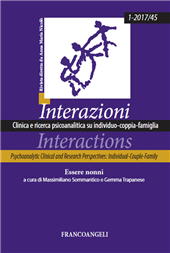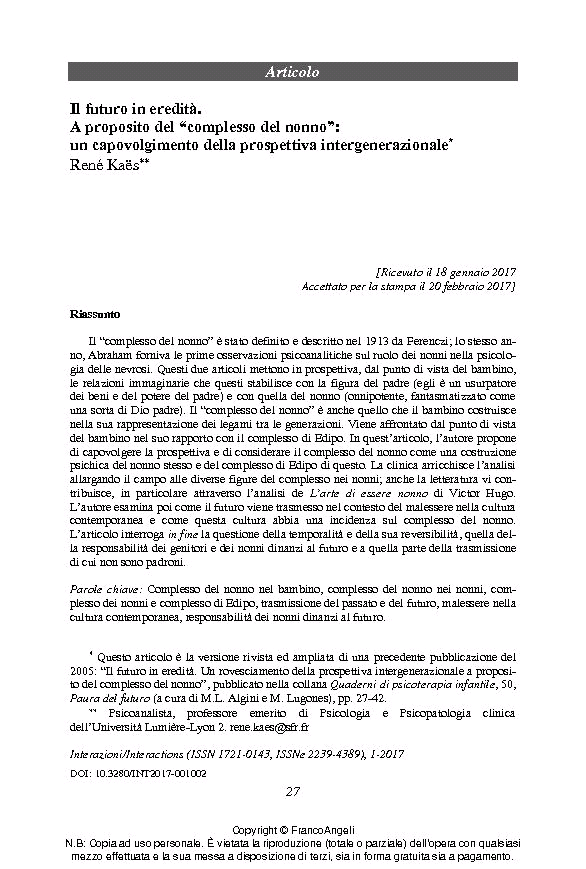Il futuro in eredità : a proposito del complesso del nonno : un capovolgimento della prospettiva intergenerazionale
27-42 p.
Il "complesso del nonno" è stato definito e descritto nel 1913 da Ferenczi; lo stesso anno, Abraham forniva le prime osservazioni psicoanalitiche sul ruolo dei nonni nella psicologia delle nevrosi. Questi due articoli mettono in prospettiva, dal punto di vista del bambino, le relazioni immaginarie che questi stabilisce con la figura del padre (egli è un usurpatore dei beni e del potere del padre) e con quella del nonno (onnipotente, fantasmatizzato come una sorta di Dio padre). Il "complesso del nonno" è anche quello che il bambino costruisce nella sua rappresentazione dei legami tra le generazioni. Viene affrontato dal punto di vista del bambino nel suo rapporto con il complesso di Edipo. In quest'articolo, l'autore propone di capovolgere la prospettiva e di considerare il complesso del nonno come una costruzione psichica del nonno stesso e del complesso di Edipo di questo.
La clinica arricchisce l'analisi allargando il campo alle diverse figure del complesso nei nonni; anche la letteratura vi contribuisce, in particolare attraverso l'analisi de L'arte di essere nonno di Victor Hugo. L'autore esamina poi come il futuro viene trasmesso nel contesto del malessere nella cultura contemporanea e come questa cultura abbia una incidenza sul complesso del nonno. L'articolo interroga in fine la questione della temporalità e della sua reversibilità, quella della responsabilità dei genitori e dei nonni dinanzi al futuro e a quella parte della trasmissione di cui non sono padroni. [Testo dell'editore].
The "grandparent complex" was defined and described by Ferenczi in 1913; the same year, Abraham provided the first psychoanalytic observations on grandparent's role on the psychology of neurosis. These two papers put in perspective, from the child point of view, the imaginary relations that he establishes with the father figure (he is a usurper of the father's goods and power) and with those of the grandfather (omnipotent, phantasised as a kind of God father). The "grandparent complex" also is that the child builds in his representation of the links between generations. This is analysed by the child point of view in his relation with the Oedipus complex. In this paper, the author proposes to reverse the perspective and to consider the grandparent complex as a psychic construction of the grandparent himself and of his Oedipus complex.
The clinical investigation enriches the analysis broadening the field to the different figures of the complex in grandparents; also the literature contributes, particularly through the analysis of The art of being a grandfather by Victor Hugo. Then the author examines how the future is transmitted in the context of the discontent in the contemporary culture and how this culture has its incidence on grandparent complex. In fine the article wonders about the temporality question and its reversibility, that of the parents' and grandparents' responsibility toward the future and that part of the transmission they don't master. [Publisher's Text].
Ist Teil von
Interazioni : clinica e ricerca psicoanalitica su individuo-coppia-famiglia : 45, 1, 2017-
Artikel aus derselben Ausgabe (einzeln erhältlich)
-
Informationen
ISSN: 2239-4389
THEMENBEREICHE
KEYWORDS
- Grandparent complex in the child, grandparent complex in the grandparents, grandparent complex and Oedipus complex, past and future transmission, discontent in con-temporary culture, grandparent responsibility toward the future



